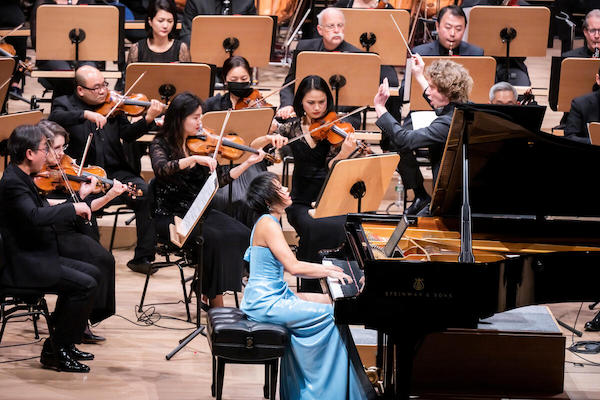Wang brings flash and charm to Philharmonic premiere of romantic Lindberg concerto

Listening to pianist Yuja Wang introduce a new concerto by Magnus Lindberg with the New York Philharmonic Thursday night, one was reminded that she is scheduled to play all four of Rachmaninoff’s piano concertos (plus the Rhapsody) in Carnegie Hall later this month. Was this what Rachmaninoff’s No. 5—or maybe his No. 25– would have sounded like?
Minus the Hollywood-style love themes, it was all there—the crashing chords, the intricate counterpoint, the oceanic surges up and down the keyboard, the rich yet scintillating orchestration. In its New York premiere, Lindberg’s Piano Concerto No. 3 left no doubt about its Russian lineage, with a nod also to Ravel and Debussy.
And who knows, Rachmaninoff’s exploration of the expressive power of dissonance late in his career might even have led to something like Lindberg’s astringent 21st-century harmonies.
Having an outstanding colorist like Wang at the keyboard cemented the connection. If there was an expressive line to be found in the torrent of notes, she found and highlighted it, amid the fluid execution of seemingly impossible passages.
Conductor Santtu-Matias Rouvali mixed a sparkle of high percussion with a variety of wind combinations, often in rapid give-and-take with the soloist, to make an expertly woven orchestral texture with distinctive strands.
The concerto’s three movements lacked titles, traditional tempo markings or even markedly different characters. (A program note by the composer mentioned “eight different characters that I’ve arranged like a William Faulkner novel,” but these were hard to discern on a first hearing.) The piece opened with a bold gesture for the soloist in the manner of Schumann or Grieg, then kept the piano busy with passages of bubbly fantasy or a roar of chordal trills.
A quieter passage, chiming with chords based on the interval of a second à la Debussy, led to a rhapsodic cadenza and a brief, enigmatic close. There were moments when one wondered where Lindberg was going with all this furious activity, but Wang’s colorful playing kept it interesting.
The second movement began like a traditional slow movement in beautifully voiced piano chords, but soon accelerated into sparkling passagework for piano and winds. After a fluid, luminous solo cadenza, the orchestra explored novel textures from delicate tremolos to a tuba-heavy rumble.
The finale opened light in the orchestra, with the piano surging in fast figurations. A distinctive four-note motive drove it all, as the soloist dazzlingly mixed feathery and marcato touches. Nearing the close, the orchestra seemed to take over, with the piano adding only brief exclamations, until one final dash up the keyboard sealed the deal.
Wang responded to the audience’s ovation with a micro encore, Sibelius’s fizzy Etude, Op. 76, no. 2, lasting under a minute.
This tradition-minded Lindberg concerto–co-commissioned by the Philharmonic in an international consortium with five other orchestras—was bookended Thursday in the most traditional way imaginable, with a Rossini overture and a Beethoven symphony.
About the performance of the Semiramide Overture, the less said the better. Rouvali’s self-conscious effort to “do” something with the familiar piece—instead of letting this tuneful, exciting music bloom naturally—led to a curdled-sounding horn chorus, much playing out of time, and the Finnish conductor signaling every cymbal crash with a fist in the air.
Beethoven’s Symphony No. 2 fared better—most of the time. The piece opened unpromisingly with an Adagio molto introduction that was rhythmically vague and lacked suspense. Slightly out of sync at first, the orchestra rallied for some crisp playing in the Allegro con brio, and Rouvali managed the balances well in the dialogues of the development section.
The improved presence of sound in the redesigned David Geffen Hall benefited the pianissimo passages and highlighted Beethoven’s creative rescorings in the recapitulation.
The rests between the short phrases of the Larghetto were a little cheated, but once a steady pulse was established the music danced gracefully, and woodwinds glowed over skipping strings. The Scherzo opened light, taking the quarter notes a bit too fast, which necessitated slowing down for the flashes of sixteenth notes later.
The finale, however, kept its Allegro molto flying, light and deft, with sonorous strings and floating winds in the episodes. With its teasing start-and-stop coda, it closed the Philharmonic’s opening concert of the new year on a suitably jolly note.
The program will be repeated 8 p.m. Saturday and 7:30 p.m. Tuesday. nyphil.org.







Posted Jan 12, 2023 at 11:11 pm by Masur
No reviews that I have seen describe to what extent attendance at the NY Phil has rebounded post-Covid.
Masur
Posted Jan 13, 2023 at 12:48 pm by Jaime Herrera
I was curious about the Lindberg piece and the review is excellent but – unfortunately – no amount of words can allow me to actually hear the piece. It is interesting that words can describe a drawing or a painting, colors and dimensions and all, allowing us to “see” it, but not a piece of music. I hope the Lindberg is available on YouTube so that I can hear it.